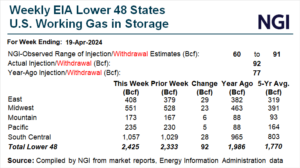Bakken Shale | Infrastructure | NGI All News Access | NGI The Weekly Gas Market Report | Regulatory
Court Vacates Permits, Orders Dakota Access to Temporarily Shut as Army Corps Prepares EIS
The U.S. District Court for the District of Columbia has ordered Energy Transfer LP to temporarily halt operations on the Dakota Access Pipeline (DAPL) within the next 30 days while an environmental impact statement (EIS) on the crude oil line is completed.

The stoppage order was handed down on Monday when the court vacated the permits for the pipeline to cross under Lake Oahe via a right-of-way administered by the U.S. Army Corps of Engineers.
In his order, Judge James Boasberg said that the Army Corps violated the National Environmental Policy Act when it granted an easement to Dakota Access LLC to construct and operate a segment of the 570,000 b/d crude oil pipeline running beneath the lake without completing an EIS.
“Fearing severe environmental consequences, American Indian Tribes on nearby reservations have sought for several years to invalidate federal permits allowing the Dakota Access Pipeline to carry oil under the lake. Today they finally achieve that goal — at least for the time being,” Boasberg said.
Energy Transfer must empty the pipeline while it awaits the EIS, which was ordered by Boasberg earlier this year and is not expected to be completed until April 2021. The 30-inch diameter DAPL stretches 1,172 miles, linking with the Energy Transfer Crude Oil Co. (Etco) pipeline in southern Illinois, which in turn flows to the Gulf Coast. It began flowing crude from North Dakota’s Bakken Shale in 2017.
Boasberg said that although he was mindful of the disruption such a shutdown would cause, “clear precedent favoring vacatur during such a remand coupled with the seriousness of the Corps’ deficiencies outweighs the negative effects of halting the oil flow for the 13 months that the Corps believes the creation of an EIS will take.”
The setback for DAPL occurred on a tough week for U.S. pipelines.
On Sunday, Dominion Energy and joint venture partner Duke Energy announced they are abandoning their plans to build the beleaguered Atlantic Coast Pipeline (ACP). Although the U.S. Supreme Court had just days earlier ruled in favor of the project, “recent developments have created an unacceptable layer of uncertainty and anticipated delays for ACP,” Dominion said.
“Between the Atlantic Coast Pipeline cancellation and now the ruling to shut down the Dakota Access Pipeline — we are deeply troubled by these setbacks for U.S. energy leadership,” said American Petroleum Institute CEO Mike Sommers. “Our nation’s outdated and convoluted permitting rules are opening the door for a barrage of baseless, activist-led litigation, undermining American energy progress and denying local communities the environmental, employment and economic benefits modern pipelines provide. The need to reform our broken permitting system has never been more urgent.”
The North Dakota Petroleum Council (NDPC) added: “The fact that DAPL has been operating, without incident, for more than three years is proof that the project is safe. DAPL employs the best technology of any pipeline in the country, utilizing leak detection and monitoring systems that are unmatched in the industry.”
The NDPC said the order was “a clear case of judicial overreach by a district court judge” that will have a “profound” impact on the oil and gas industry and North Dakota, where the oil industry provides more than 50% of all state tax revenues and supports more than 55,000 jobs.
“This order will directly harm North Dakota’s economy and its citizens,” said NDPC President Ron Ness. “Shutting down the pipeline will cut off North Dakota oil producers from the safest, most reliable and economic method of transporting our high-quality Bakken oil to the best markets in the country. Increased rail traffic will impact North Dakota and regional farmers by creating rail capacity issues as harvest season ramps-up this fall.”
In a note to clients after the court’s decision, ClearView Energy Partners LLC analysts said the pipeline’s return to service could become heavily contingent on the outcome of the presidential election. If Trump is re-elected, analysts expect the White House may encourage “prioritizing” the review of this project to recover potential job losses and minimize potential adverse economic consequences of a halt in operations. However, the extent to which the Army Corps can accelerate the timeline offered in their briefs is not clear.
“The Corps and Dakota Access could try to appeal Judge Boasberg’s adverse ruling to the U.S. Court of Appeals to the D.C. Circuit, however, we would not give high odds to the success of such an effort restoring service before the Corps completes the required EIS, given Judge Boasberg’s detailed decision today,” ClearView said.
Meanwhile, the analysts think there is “a strong possibility” that a new administration under Joe Biden could decide to not reissue the authorizations now that the permits have been vacated. While there is no guarantee that the Army Corps under a Biden Administration would withhold the permits, “we do think that a differently minded administration could, at minimum, meaningfully delay them in order to evaluate whether other market options can take up the slack in a lower demand environment.”
Furthermore, the status of the economy and fuel demand in early 2021 is likely to be relevant to agency decision-making, according to ClearView. “Therefore, continued weak demand could frustrate Dakota Access’ return to service in 2021, and would appear to similarly imperil the company’s plan to upgrade the pipeline’s capacity via the addition of new compression.”
© 2024 Natural Gas Intelligence. All rights reserved.
ISSN © 2577-9877 | ISSN © 1532-1266 | ISSN © 2158-8023 |


